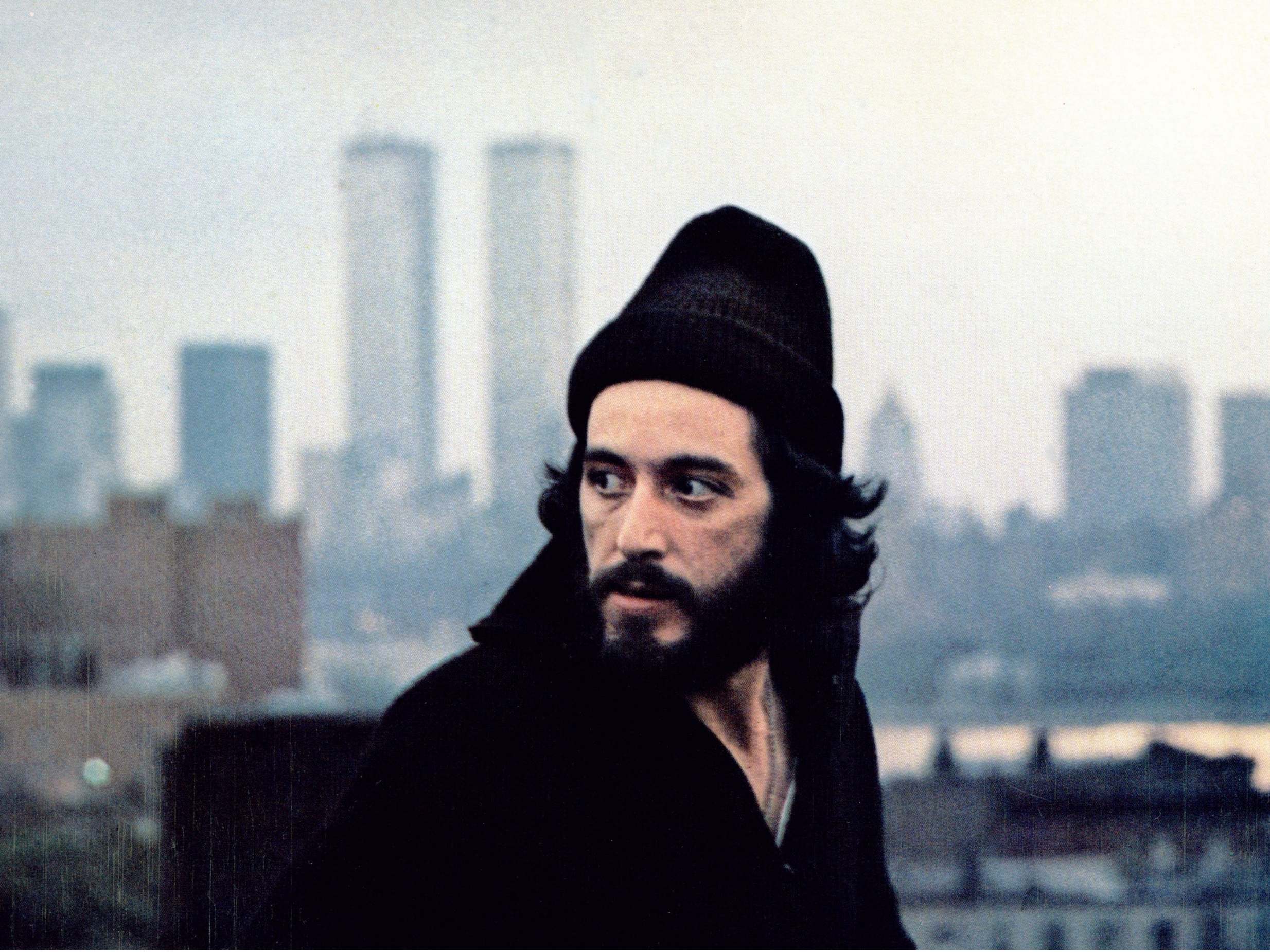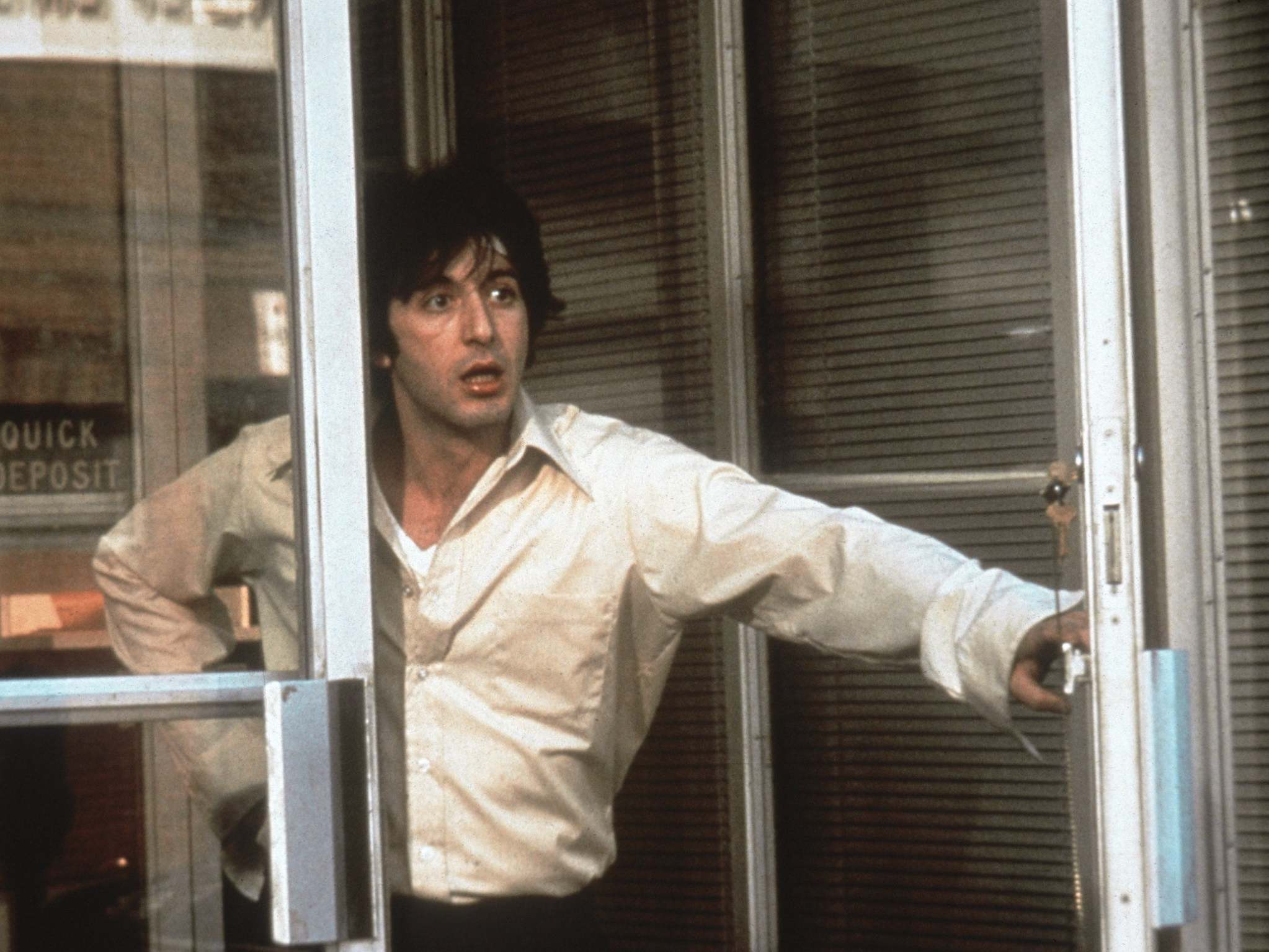Al Pacino: His 10 greatest films, from Scarface to Serpico
The legendary actor turns 80 this weekend. To celebrate, Clarisse Loughrey revisits his 10 greatest performances so far


Your support helps us to tell the story
From reproductive rights to climate change to Big Tech, The Independent is on the ground when the story is developing. Whether it's investigating the financials of Elon Musk's pro-Trump PAC or producing our latest documentary, 'The A Word', which shines a light on the American women fighting for reproductive rights, we know how important it is to parse out the facts from the messaging.
At such a critical moment in US history, we need reporters on the ground. Your donation allows us to keep sending journalists to speak to both sides of the story.
The Independent is trusted by Americans across the entire political spectrum. And unlike many other quality news outlets, we choose not to lock Americans out of our reporting and analysis with paywalls. We believe quality journalism should be available to everyone, paid for by those who can afford it.
Your support makes all the difference.Michael Mann thinks of Al Pacino as like the greater painter Picasso, who creates his art through “a series of brushstrokes”. Take 1995’s Heat, which Mann himself directed, and the actor’s infamous delivery of the line: “She’s got a GREAT ASS!” It’s odd, ludicrous and entirely unexpected – just as Picasso would allow a sudden intrusion of colour or an eye to drop halfway down his subject’s face.
Pacino has always been a kind of jack-in-the-box actor. He stores a world-devouring rage deep behind those hungry, coal-black eyes, then turns the crank. Sometimes it explodes out of him; sometimes it’s left to vibrate beneath the surface. He’ll oscillate between the extremes of complete control and complete loss of control – ideas he can apply equally to the roles of criminal, lover, or addict.
A few of Pacino’s characters, such as Tony Montana and Michael Corleone, have become embedded in popular culture. His work is so visible that it’s strangely easy to ignore. He’s won an Oscar, an Emmy, and a Tony (known as the “Triple Crown of Acting”), but also has a history of being snubbed by his peers.
The Academy didn’t reward him for The Godfather, Serpico, or Dog Day Afternoon, but chucked him a conciliatory Oscar in 1993 for his aggressive “hoo-ah”-ing in Scent of a Woman. It’s also led to a tendency to focus on his blips – there’s no talking about Pacino now without bringing up the ironically cringeworthy (and also non-ironically cringeworthy) Dunkin’ Donuts rap he did in 2011’s Jack and Jill.
But the trajectory makes sense. So early on in his career did he perfect his craft (with an incredible run between 1971 and 1975) that he’s spent the following decades in desperate search of something new. “A man’s reach should exceed his grasp, or what’s a heaven for?” wrote Robert Browning, in his poem “Andrea del Sarto”. Pacino has quoted it often. The lows have always been worth the highs.
He’s had his own mini-Renaissance of late, thanks to his work in The Irishman, Once Upon a Time… in Hollywood, and Hunters. It’s a formidable string of performances from an actor who turns 80 tomorrow (25 April), though he doesn’t intend to retire anytime soon. There will surely be more great performances to come. Here are the best so far, ranked.
10. Scarecrow (1973)
A forgotten gem in Pacino’s filmography, Scarecrow offers a bristling display of the actor’s full-range of talents. Here, director Jerry Schatzberg pairs him up with Gene Hackman for an odd-couple comedy about two drifters who travel from California to Pittsburgh to start a car wash business. They’re at odds, but harmonious. Hackman plays the brutish lothario, while Pacino is the wounded clown. He’s jittery, but sweet and sensitive in ways he rarely got to explore in later roles. A traumatic event in the final act then destroys what scraps of innocence he still has left. The subsequent breakdown, which leaves him screaming and thrashing in waters of a public fountain, is a devastating spectacle. While the film was honoured at the Cannes Film Festival, it’s since largely drifted out of view. It’s a shame. Scarecrow is a heartfelt eulogy to masculinity lost to the cavernous jaws of the American dream.
9. Glengarry Glen Ross (1992)
It’s one of the great ensembles of Hollywood cinema: Pacino, Jack Lemmon, Alec Baldwin, Alan Arkin, Jonathan Pryce and Ed Harris – all of them locked in a vicious, bestial battle for corporate supremacy as the employees of a real estate agency. David Mamet’s screenplay, based on his own Pulitzer Prize-winning play, drips with linguistic poisons. And Pacino has a divine gift for delivering them. An insult as workaday as “you stupid f***in’ c***” might seem like a cheap shot but, coming out of Pacino’s mouth, it’s like an arrow to the head. As Ricky Roma, the office’s top “closer”, the actor gets to play the most oil-slicked, crafty character of the entire film. His charisma is palpable, but so is his insatiable greed. No wonder he was the only cast member to earn an Oscar nomination.
8. Scarface (1983)

It’s a stark indictment of Hollywood’s diversity phobia that Pacino, an Italian-American, was cast by Brian De Palma as a Latinx immigrant not once, but twice (more on Carlito’s Way later). But the actor’s take on Tony Montana, a Miami drug dealer who climbs to the top and immediately loses the plot, is the stuff of legend. Cocaine flows through this man’s veins. His delusions have cemented into gilded kitsch. He thinks of a firearm as his “little friend”. Pacino delivers Tony in the same erratic cadence as Frank Slade in Scent of a Woman, but his exorbitance here is justified. Tony isn’t a man; he’s a symbol of total moral corruption. The fact he’s since been adopted as an entrepreneurial cult hero is telling – so is the fact that the decade’s consumerist worship was so absurd that many critics failed to realise that De Palma was operating firmly in the role of satirist.

Watch Apple TV+ free for 7 days
New subscribers only. £8.99/mo. after free trial. Plan auto-renews until cancelled

Watch Apple TV+ free for 7 days
New subscribers only. £8.99/mo. after free trial. Plan auto-renews until cancelled
7. The Irishman (2019)
If the past couple of decades have seen Pacino dip into self-parody, The Irishman was his chance to reassert himself as one of the greats. The same was true of co-stars Robert De Niro and Joe Pesci – even director Martin Scorsese went out and proved he’s still the undisputed master of the gangster genre. It’s a deeply reflective, muted film that works both as a throwback to the golden era of these men’s careers and a critical re-examination of their own legacies. Pacino, playing union president Jimmy Hoffa, reignites his firebrand charisma only to immediately ground it in a complex web of righteousness and moral indignation. It might not be the showiest performance of his career, but it’s a sublime return to form.
6. Carlito’s Way (1993)
Carlito’s Way never deserved its reputation as Scarface’s little sibling. Yes, the surface similarities are there – they’re both De Palma-directed stories that star Pacino as a Latinx criminal type. But they’re tonally alien to each other. Scarface is the parody of masculinity, while Carlito’s Way tackles the idea with far more sincerity. Its main character, Carlito Brigante, has vowed to go straight, but finds that the past is near-impossible to escape. And so Pacino’s approach here is to go softer and more understated, underpinned by a sense of tragic inevitability. When harassed by Benny (John Leguizamo), a cocksure younger gangster, you can feel Carlito’s old impulse for violence rear its head. But he tries to push it down. He fumbles a little. His eyes flit around the room, suddenly filled with uncertainty. Carlito’s clearly uncomfortable with this new skin he’s crafted for himself. When his newfound dedication to morality backfires, audiences are sure to come away with a bitter taste in their mouth.
5. The Panic in Needle Park (1971)
When The Panic in Needle Park was first released, few paid attention to Pacino’s nervy, heated performance as a New York drug addict. It was the second film he ever did, but it was also his co-star Kitty Winn’s screen debut – audiences fell hard for her raw vulnerability and for the way fear flickered in her eyes like a trapped moth. She won Best Actress at the Cannes Film Festival. It’s a shame she never enjoyed a career like Pacino’s. But The Panic in Needle Park is not only an important Pacino performance, it’s a mesmerising one – the actor here appears as a fully formed talent. Co-written by Joan Didion, the film navigates all the highs and lows of the addiction cycle, and Pacino readily embraces each emotional swing. He can express love in its purest form and at its most curdled. The film’s director, Schatzberg, would work with him again in Scarecrow, while it also landed him his career-changing role of Michael Corleone in The Godfather.
4. Serpico (1973)

Pacino’s greatest performances are all concentrated in a single run of films, kicked off by 1971’s The Panic in Needle Park and concluding with 1975’s Dog Day Afternoon. Tucked in-between the first two Godfathers is Sidney Lumet’s compelling cop-drama Serpico – a chance for Pacino to hop the moral fence and explore life as the good guy. It also gave him an opportunity to grow out a luscious head of hippie hair and a hefty beard. The film is based on the true story of NYPD officer Frank Serpico, a whistleblower who exposed rampant corruption in law enforcement and suffered greatly for it. But Pacino was able to bring the same qualities here as he did to his usual rogue’s gallery. Frank’s sanity is stretched on the rack until it’s at the maximum point of tension. But the anger here is righteous, at least.
3. The Godfather (1972)
The studio never wanted Pacino to play Michael Corleone. To them, he was far too screwy and intense – still the drug addict from The Panic in Needle Park. What the Godfather needed was the strong jawline and starry charisma of a Robert Redford or a Warren Beatty. But Francis Ford Coppola recognised something in Pacino, which he described as “this striking magnetic quality, this smouldering ambience”. Only he could faithfully portray a man robbed of his innocence by the invisible, but undeniable, pull of familial duty. Michael is committed to living a normal, American life outside of the mob, but finds himself drawn back into the endless cycle of violence his family perpetuates. As Pacino’s face hardens and grows colder, Michael comes to the realisation that not only can he not escape the sins of his father – there is nothing to do but embrace them.
2. Dog Day Afternoon (1975)

One of the quintessential Pacino scenes sees him pace and up down the sidewalk outside of a city bank like a caged tiger. He’s playing Sonny Wortzik, a bank robber up against the wall. The police have him surrounded. The media can taste blood. He knows that things will end badly. All he can do now is try to take some small control of the situation. And so he starts to cry “Attica! Attica! Attica!”, riling the crowd up by reminding them of the brute force law enforcement used in a riot at the Attica prison a year earlier. Pacino is filled with a kind of transcendent hysteria here. He spits the words out like he’s exorcising a malevolent spirit from his body. His is a dual panic: not only has he been plunged into a precarious hostage situation, but he’s afraid people will discover that he’s, in fact, a married man who wants to use the money to pay for his girlfriend’s (Chris Sarandon) sex reassignment surgery. Lumet’s film (his second collaboration with Pacino after The Panic in Needle Park) is a captivating, sensory slice of 1970s New York. Pacino brings both texture and depth to that world.
1. The Godfather Part II (1974)
Michael Corleone is, undeniably, the greatest role of the actor’s career. What makes the difference between his performance in the first and second Godfather films (the third is probably best left unmentioned) is the extent of his transformation. He starts to fall in Part I, but becomes unrecognisable by Part II. He’s a man now willing to murder his own family in order to keep its sanctity. When he gives his brother Fredo (John Cazale) the kiss of death, his emotions shift so quickly between raptorial fury – there’s a moment you think he might just crush Fredo with his own hands – and a profound sense of loss. It’s heartbreaking to see anyone so utterly consumed by darkness. Coppola inserts flashbacks to the crimes of Michael’s father, Vito Corleone (Robert De Niro), to hammer home the cyclical nature of violence. It’s one of Hollywood’s great tragic arcs. And Pacino commits like his life depends on it – those eyes we’re so used to seeing filled with fiery rage are now also flecked with deep guilt and regret. Pacino was nominated for an Oscar for The Godfather Part II, but lost the award to Art Carney for Harry and Tonto. It remains one of the Academy’s most outrageous blunders.
Join our commenting forum
Join thought-provoking conversations, follow other Independent readers and see their replies
Comments